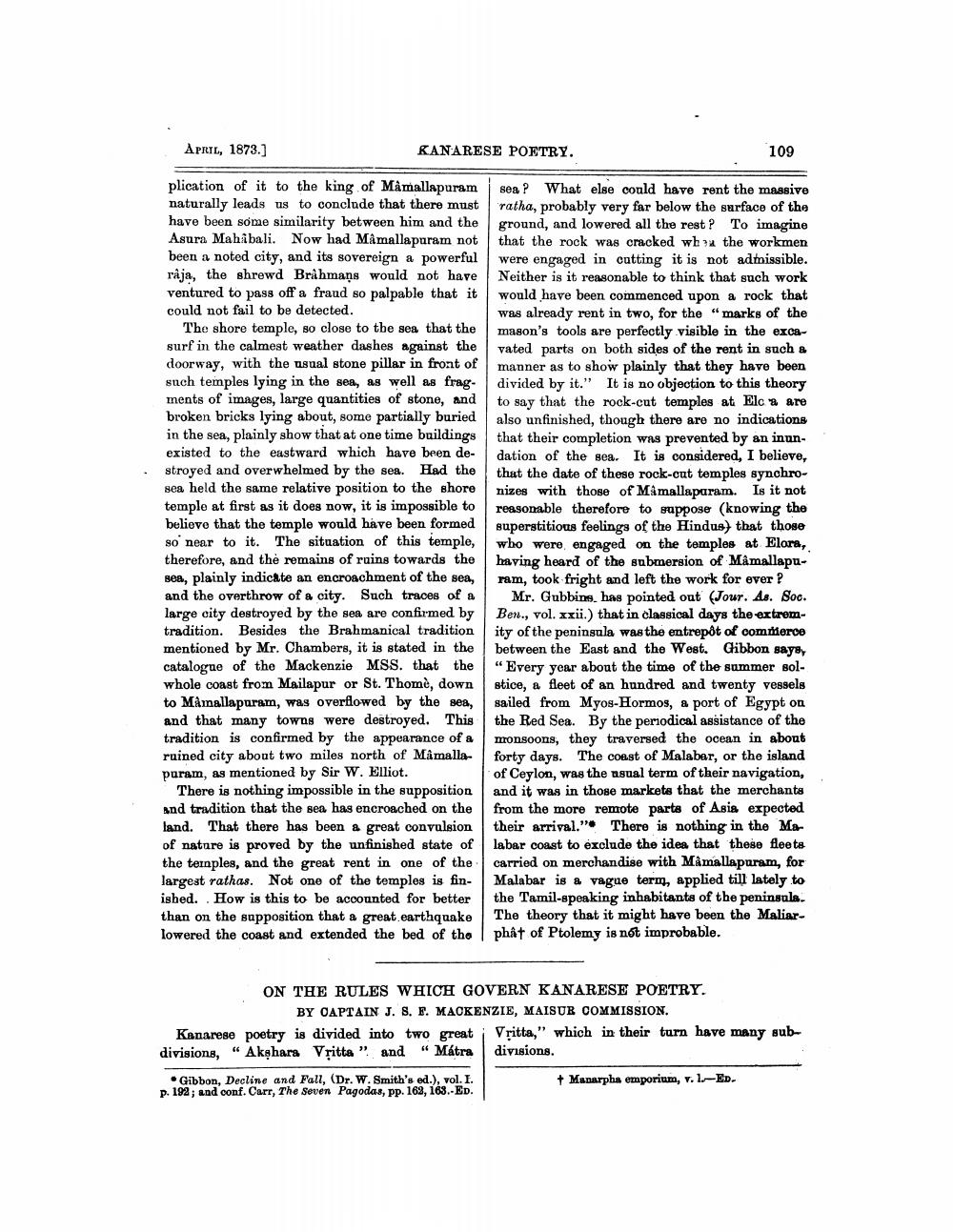________________
APRIL, 1873.]
plication of it to the king of Mamallapuram naturally leads us to conclude that there must have been some similarity between him and the Asura Mahabali. Now had Mamallapuram not been a noted city, and its sovereign a powerful raja, the shrewd Brahmans would not have ventured to pass off a fraud so palpable that it could not fail to be detected.
KANARESE POETRY.
The shore temple, so close to the sea that the surf in the calmest weather dashes against the doorway, with the usual stone pillar in front of such temples lying in the sea, as well as fragments of images, large quantities of stone, and broken bricks lying about, some partially buried in the sea, plainly show that at one time buildings existed to the eastward which have been destroyed and overwhelmed by the sea. Had the sea held the same relative position to the shore temple at first as it does now, it is impossible to believe that the temple would have been formed so near to it. The situation of this temple, therefore, and the remains of ruins towards the sea, plainly indicate an encroachment of the sea, and the overthrow of a city. Such traces of a large city destroyed by the sea are confirmed by tradition. Besides the Brahmanical tradition mentioned by Mr. Chambers, it is stated in the catalogue of the Mackenzie MSS. that the whole coast from Mailapur or St. Thomè, down to Mamallapuram, was overflowed by the sea, and that many towns were destroyed. This tradition is confirmed by the appearance of a ruined city about two miles north of Mâmallapuram, as mentioned by Sir W. Elliot.
There is nothing impossible in the supposition and tradition that the sea has encroached on the land. That there has been a great convulsion of nature is proved by the unfinished state of the temples, and the great rent in one of the largest rathas. Not one of the temples is finished. How is this to be accounted for better than on the supposition that a great earthquake lowered the coast and extended the bed of the
Kanarese poetry is divided into two great divisions, "Akshara Vritta" and "Mátra
ON THE RULES WHICH GOVERN KANARESE POETRY. BY CAPTAIN J. S. F. MACKENZIE, MAISUR COMMISSION.
Gibbon, Decline and Fall, (Dr. W. Smith's ed.), vol. I. p. 192; and conf. Carr, The Seven Pagodas, pp. 163, 163.-ED.
sea? What else could have rent the massive ratha, probably very far below the surface of the ground, and lowered all the rest? To imagine that the rock was cracked wha the workmen were engaged in cutting it is not admissible. Neither is it reasonable to think that such work would have been commenced upon a rock that was already rent in two, for the "marks of the mason's tools are perfectly visible in the excavated parts on both sides of the rent in such a manner as to show plainly that they have been divided by it." It is no objection to this theory to say that the rock-cut temples at Elca are also unfinished, though there are no indications that their completion was prevented by an inundation of the sea. It is considered, I believe, that the date of these rock-cut temples synchronizes with those of Mamallapuram. Is it not reasonable therefore to suppose (knowing the superstitious feelings of the Hindus) that those who were engaged on the temples at Elora, having heard of the submersion of Mamallapuram, took fright and left the work for ever?
109
Mr. Gubbins, has pointed out (Jour. As. Soc. Ben., vol. xxii.) that in classical days the extremity of the peninsula was the entrepôt of commerce between the East and the West. Gibbon says, "Every year about the time of the summer solstice, a fleet of an hundred and twenty vessels sailed from Myos-Hormos, a port of Egypt on the Red Sea. By the periodical assistance of the monsoons, they traversed the ocean in about forty days. The coast of Malabar, or the island of Ceylon, was the usual term of their navigation, and it was in those markets that the merchants from the more remote parts of Asia expected their arrival." There is nothing in the Malabar coast to exclude the idea that these fleets carried on merchandise with Mamallapuram, for Malabar is a vague term, applied till lately to the Tamil-speaking inhabitants of the peninsula. The theory that it might have been the Maliarphât of Ptolemy is not improbable.
Vritta," which in their turn have many subdivisions.
+ Manarpha emporium, v. 1.-ED.




